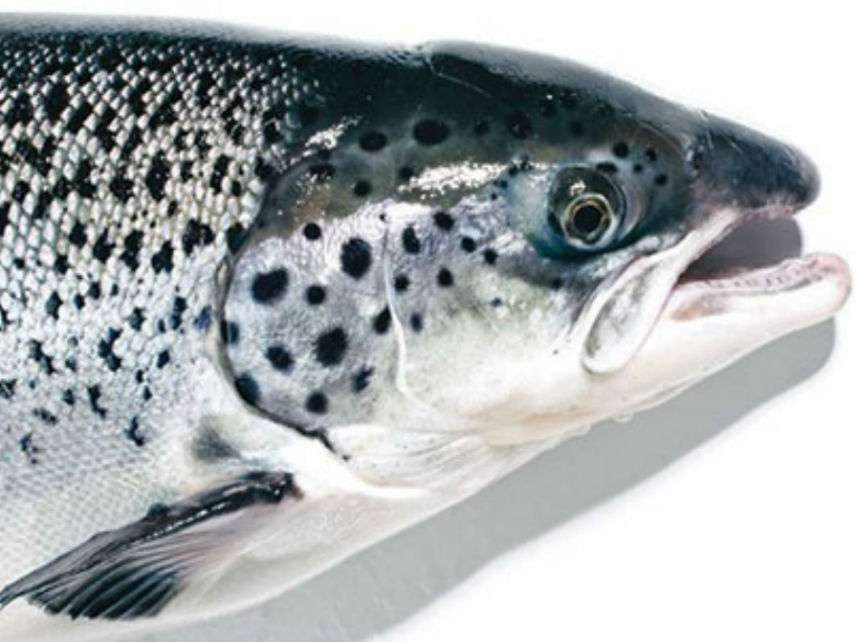Canadians Can Eat Genetically Enhanced Salmon; Americans Can't
Because Congress requires the FDA to come up with a "frankenfish" labeling scheme

Our neighors to the north can now enjoy salmon genetically enhanced to grow faster and eat less feed. Thanks to absurd overregulation, Americans can't.
The Atlantic salmon are enhanced using a Chinook salmon gene that enables them to grow much faster using less feed. Nature News reports that AquaBounty Technologies, which developed the fish, has now sold nearly five tons of it to customers in Canada. The company applied to the Food and Drug Administration (FDA) to get approval for its genetically enhanced salmon back in 1995; it took the agency til 2015 to rule that AquAdvantage salmon, as the product is known, "is as safe to eat as any non-genetically engineered (GE) Atlantic salmon, and also as nutritious."
Health Canada approved it for sale six months later. But you still can't buy it here in the U.S. The usual claque of anti-science activists are suing the FDA in an effort to block the company from marketing the fish. And Alaska Sen. Lisa Murkowski, aiming to protect her state's salmon fishers from competition, has inserted a rider in the agriculture spending bill that bans the sale of enhanced salmon until the the FDA publishes its final labeling guidelines. Murkowski claims that Americans must be warned that AquAdvantage salmon are "frankenfish."
As a general regulatory principle, genetically enhanced foods do not have to be labeled unless they are nutritionally different than their conventional versions. Canada sensibly does not require special labels on AquAdvantage salmon.
AquaBounty is currently raising its sterile triploid salmon in an onshore facility in Panama. In June the company announced that it will expand a Prince Edward Island production facility and has acquired a fish farm in Indiana, where it plans to begin raising its enhanced fish for the U.S. market. Aquabounty sold its fish at wholesale for $5.30 per pound in Canada. In comparison, Tradex Foods reports that the current price on fresh atlantic salmon (farmed) in Miami for trimmed fillets is $4.25-$4.30 per pound.
In any case, Alaskan fishers should rest easy. The Aquabounty facility in Indiana would produce about 1,200 tons of Atlantic salmon annually. Americans annually consume about 180,000 tons of Atlantic salmon, of which 170,000 tons are imported. Only 2,000 tons of Atlantic salmon are wild-caught. Most of the 105,000 tons of Pacific salmon is wild and is caught in domestic waters.
Congress has tied the FDA's hands with respect to the AquAdvantage salmon, but the agency could do a great deal of good by withdrawing the scientifically ridiculous draft regulations meant to govern genomically improved livestock, which the Obama administration issued on its way out of the door in January.
Personally, I dislike the flavor of salmon. But I plan to eat an AquAdvantage fillet as soon as I can legally lay hands on one.



Show Comments (36)